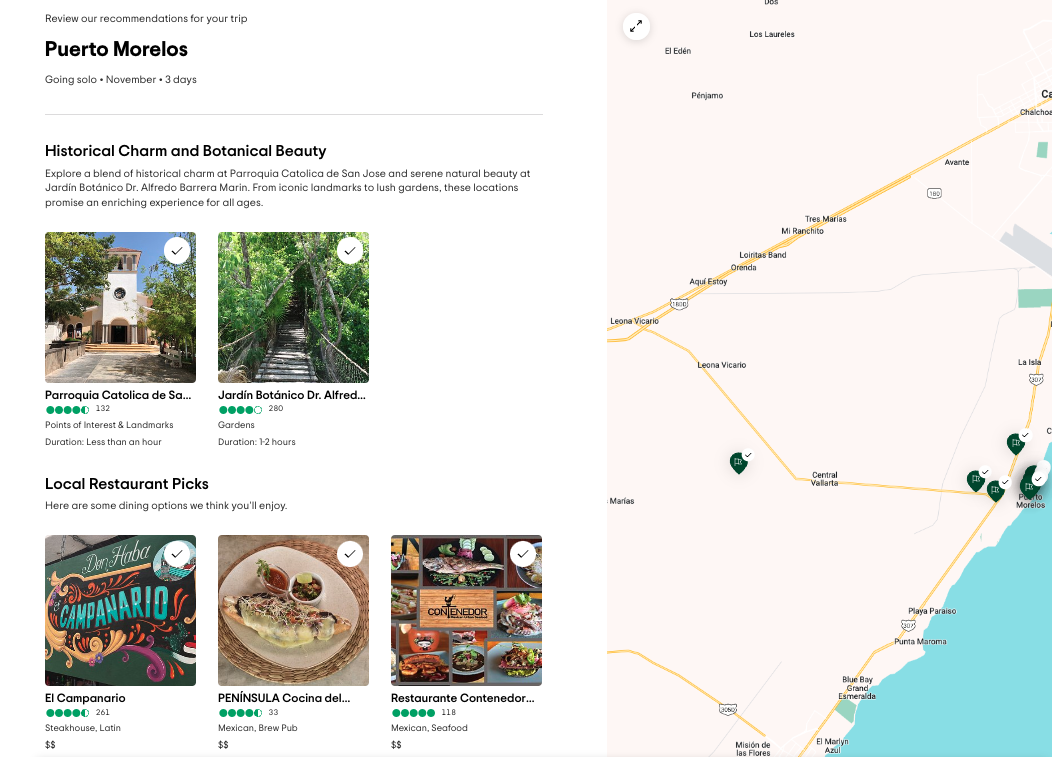Is your tourism company seeing a drop in bookings while your competition seems to be growing stronger? Or maybe you’ve noticed that the conversion rate on your website is falling despite increased traffic. Such challenges can keep any entrepreneur in the industry up at night.
You’re not alone. Many tourism business owners find themselves in a similar situation. However, these challenges hide a huge opportunity. Artificial intelligence is confidently entering the world of tourism, significantly impacting travelers’ experiences.
Let’s look at the numbers: an InsightAce Analytic report predicts that the AI market in tourism will grow from $16.2 billion in 2023 to a staggering $167 billion in 2031, with an annual growth rate of 34.7%. It’s a clear signal that AI is becoming a key player in our industry.
Why invest in this technology? Because your customers expect more than ever – personalized offers, smooth service, and innovative solutions that will make their trips exceptional. AI can meet these expectations, improve conversions, and stand out from the competition.
Don’t know where to start? In this article, we’ll present five effective ways that artificial intelligence can improve your customers’ experiences. Whether you’re just considering implementing AI or want to improve existing solutions, these strategies will help you catch up with (or even overtake) the competition and meet the demands of modern tourists.
1. Personalized Travel Plans
Artificial intelligence opens up new possibilities in personalizing tourist offers and entire travel plans for your customers. It’s no longer just simply retargeting, which involves displaying ads for places a user has previously viewed. AI goes further, deeply analyzing travelers’ preferences and creating dynamic, tailored proposals.
AI algorithms analyze not only search history but also preferences regarding travel style, budget, favorite activities, or even daily rhythm. Based on this, they create offers that really match the client’s taste. It could be a proposal for extreme adventures for adrenaline seekers or a quiet getaway away from the hustle and bustle for those needing relaxation.
An excellent example of using AI in travel personalization is the AI Trip Builder tool introduced by TripAdvisor. The system asks the user four short questions and then creates a personalized travel plan based on each day. Importantly, the recommendations are based on millions of other travelers’ opinions, increasing their credibility.

Why invest in such solutions? A McKinsey report shows that 71% of consumers expect personalized interactions with companies. Meeting these expectations translates into higher customer satisfaction, better reviews, and greater brand loyalty.
2. Chatbots and Virtual Assistants
Chatbots and virtual assistants powered by artificial intelligence are another step in revolutionizing customer service in the tourism industry. They’re no longer just simple tools answering the most frequently asked questions. Modern chatbots are advanced AI-based tourist assistants that can conduct advanced conversations, solve complex problems, and provide personalized help at every journey stage.
These modern chatbots analyze the context of the conversation, the customer’s interaction history, and their preferences to provide accurate and personalized answers. They can help in choosing a destination, suggest attractions tailored to the tourist’s interests, and even assist in solving problems during the trip, such as changing reservations or providing information about flight delays.
A great example of an advanced AI assistant is the Trip Planner from Booking.com. It uses GPT technology to conduct natural conversations with users. The assistant can not only answer questions but also actively advise on trip planning, suggesting accommodation, transportation, and attraction options based on user preferences and travel trends.
Wondering how your customers will react to the implementation of such solutions? It turns out that even adult travelers are becoming more open to new technologies. It’s shown, for example, by data from Statista, according to which over 40% of adult Americans are interested in using AI-based flight and hotel recommendations. This demonstrates the growing acceptance of virtual assistants in the tourism industry and customers’ openness to such innovations.
3. AI-Based Search Engines
Imagine your customers being able to find the perfect travel offer on your website in the blink of an eye without wading through dozens of pages of results. Artificial intelligence-based search engines are offering this reality, revolutionizing the way tourists plan their trips.
We don’t have to look far for examples because this is exactly how Qtravel Search works—our innovative tourist search engine uses advanced algorithms to not only find offers but also understand travelers’ true intentions and needs.
How does it work? Let’s imagine a client enters a “quiet weekend with family.” Qtravel Search will not only consider these words but also understand the context. It will suggest family-friendly hotels with facilities for children in quiet locations, maybe with an all-inclusive option for parents’ convenience.
But that’s not all. It also can learn with each search. It analyzes user behaviors, preferences, and interaction history to deliver increasingly accurate results over time. It’s like a personal travel advisor who better understands their client with each conversation.
According to Amadeus’s “At the Big Data Crossroads” study, four out of ten travelers are willing to share their data in exchange for personalization. It shows that modern tourists appreciate and expect personalized experiences, and AI search engines are key to providing them.
Besides user satisfaction, the potential for increased conversion is worth mentioning. When a client quickly finds an offer perfectly tailored to their needs, the likelihood of booking with you significantly increases. This means not only satisfied customers but also real business benefits for your company.
4. Automatic Website Optimization Based on User Behavior Analysis
Analyzing user behavior on a website is a powerful tool for tourism companies. It allows them to understand what attracts customers’ attention and what causes their frustration, enabling continuous improvement of the online experience. For example, Airbnb uses such real-time personalization, which has been the subject of extensive research.
Here are the most important ways AI can revolutionize tourism website optimization:
- Dynamic personalization: AI can analyze every user’s click and move on the site, adjusting content in real time to their preferences. It ensures that each tourist sees offers and content most relevant to their needs.
- Intelligent recommendations: Based on the browsing history and behaviors of similar users, AI can suggest destinations, hotels, or attractions that are likely to interest a given tourist.
- Purchase path optimization: AI can identify points where users most often abandon reservations, allowing for automatic improvements and increased conversion.
- Predicting needs: Advanced algorithms can predict what information a user will look for and proactively provide it, saving their time and reducing frustration.
Implementing such an approach to automatic website analysis and optimization can be key to understanding your customers on a completely new level. In the tourism industry, where personalization and optimization are crucial, using AI to continuously improve the online experience can provide a significant competitive advantage.
5. Voice Assistants in Hotel Rooms
We’ve already discussed how artificial intelligence can help increase bookings and improve customer experiences at the travel planning stage. Now, let’s focus on how AI can enhance the quality of stay for guests who have already reached their travel destination. One of the most innovative solutions is voice assistants in hotel rooms.
Imagine your guests being able to control every aspect of their stay with their voices. Sounds futuristic? Yet it’s already a reality thanks to the integration of voice assistants in hotel rooms.
A great example is Alexa for Hospitality, which was implemented by the Marriott chain. It is not an ordinary voice assistant – it’s a specially designed-tool for the hotel industry. Here’s how it works:
- Brand-level personalization: Each hotel brand can customize Alexa to its profile. For example, in Westin hotels focusing on wellness, Alexa offers meditation playlists and recommends jogging routes.
- Room control: Guests can control lighting, temperature, blinds, and TV by voice. It is not only convenient but also energy-saving.
- Virtual concierge: Alexa can provide information about the hotel, order room service, or book spa treatments – all without the need to call reception.
- Integration with hotel systems: The assistant works with hotel management systems, streamlining processes and allowing for faster fulfillment of guest requests.
- Data Privacy: Upon check-out, all personal guest data is automatically deleted from the device.
Interestingly, according to Amazon, almost 90% of guests rated using Alexa in the room as “good” or “excellent”. Moreover, over 70% said they would choose rooms with Alexa in the future if they had the option.
Offering voice assistants in rooms is a step towards the hotel of the future. It signals to guests that your brand is keeping up with the times and offering innovative solutions that really improve the quality of stay.
Want to implement AI in your tourism company? With Qtravel Search, you can do it in just a few days.
Implementing artificial intelligence doesn’t have to mean investing in expensive, built-from-scratch solutions. You can use ready-made products like our Qtravel Search engine, which was created specifically for the tourism industry.
Qtravel Search is a configured, ready-to-use product that you can integrate within just a few days. It will allow you to offer your customers next-generation search. Our tool is developer-friendly—we do all the tedious work so you can focus on your business.
Don’t wait – start harnessing the power of AI now and get ahead of the competition.
Check out the Qtravel Search demo and see how it can transform your business!
